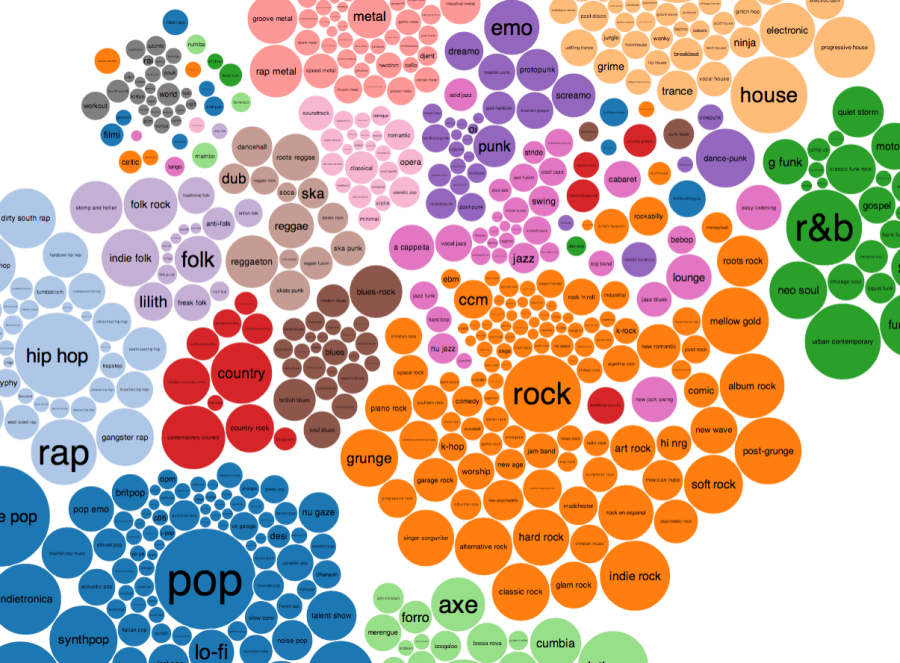The Sounds of Music at EHS
November 22, 2015
Throughout time, music has had a great impact on students. Tania Dworjan of LovetoKnow, a branch off of Lifestyle Magazine, says, “During the teen years, many people use music as an escape. Often, someone will try to find lyrics that best identify with his or her present situation. Empathy through music is one of many ways that teens can help establish who they are, partially because of the diversity of music. No matter what a teen is interested in -from hip hop to pop to metal- there are a large amount of bands in each music scene. There are also many different messages in music. Some songs have lyrics that speak of a passionate love, while others speak of anger. There’s music for just about every mood a teen feels.” Music is a great way for teenagers to release their emotions and young angst.
LiveStrong also agrees with this, saying, “For teenagers, music frequently provides a means of identifying or labeling certain emotions. In music with lyrics, teenagers may identify with expressed emotions of happiness and sadness, or with sociological or political themes. For teenagers struggling with issues surrounding adolescent, sexuality, sexual orientation, loneliness or depression, identifying these emotions in music can be extremely helpful.”
Music clearly has a great influence on the way that students think and feel, but how do the vast variety of genres affect EHS students?
Electronic Music
Electronic music is exactly what it sounds like. Most of the sounds are generated electronically, instead of with an instrument. A key factor in almost every electronic song is the bass. EHS student Alec Lockhart says that electronic music appeals to him because “for the most part, it’s different and pretty interesting. I’ve always liked music with a lot of bass, so electronic fits that description.”
But how does electronic music affect EHS students? Lockhart informs us, “For how it makes me feel, I’m not exactly sure, but I will say that it fits my technology obsession!”
Christian Music
When most people think of Christian Music, they think of a choir at church singing hymns. But that isn’t all that Christian music is. There are many sub genres of Christian music, including Christian rock, Christian hip hop, and (believe it or not) Christian hardcore. What ties all these genres together is the fact that the music relates to Christianity and religion. In fact, some Christian bands don’t even sing about their religion. They are just classified as Christian bands because the artists themselves are Christians.
EHS student Jon Richason says, “It appeals to me in the way it makes me feel. It makes me feel alive, and pumped up for God, and to follow him.”
Pop Music
Pop music, originally derived from Rock and Roll, is a term used to describe popular music, such as music heard on the radio or music on the top charts. News site AboutEntertainment says, “The basic form for pop music is the song and usually a song consisting of verse and repeated chorus. Most often the songs are between 2 1/2 minutes and 5 1/2 minutes in length.”
Student at EHS Danielle Mattson says that pop music appeals to her because, “I like that it has a rhythm and beat (this is important to me as I am a tap dancer), and that most of the time it is about something that you can relate to.”
How does pop music make EHS students feel? According to Mattson, “It makes me feel upbeat and relaxed, because I can dance to it easily.”
Country Music
Oxford Dictionary defines country music as “a form of popular music originating in the rural southern US. It is traditionally a mixture of ballads and dance tunes played characteristically on fiddle, guitar, steel guitar, drums, and keyboard.”
2007 EHS graduate John Weinhandl says that as a high school student, country music was appealing to him because of the fact that it made him “feel the blues.” He also quite enjoyed the rise in female artists.
Current EHS student Sonia Arteaga says, “I like country music because I really enjoy how uplifting and fun most songs are. It makes me feel excited.”
Alternative/Indie Music
There isn’t really a great way to define alternative or indie music. Almost anything that isn’t considered to be “mainstream” is often thrown into this category. Merriam Webster attempts to define it, saying that it is “music that is produced by performers who are outside the musical mainstream, that is typically regarded as more eclectic, original, or challenging than most popular music (such as conventional rock, pop, or country), and that is often distributed by independent record labels.”
Broderick Mastel-Hanneman says that this particular genre of music appeals to him because it makes him feel good and happy.
Rock Music
Like alternative music, rock music is very hard to define. It has many different subgenres. Fitting into the category of “rock music” are classic rock, metal, death metal, post hardcore, grunge, punk rock, and many more.
EHS student Kat Mayes says, “I just really like the freeness of the music. It doesn’t have to be confined in the specific patterns of a repetitive chorus that plays on the radio. Rock gives its own atmosphere in the fact that you don’t need anything. All you need is the music.”
There are many more genres of music than the ones specifically explored above. Apologies go out to listeners of any genre missed.
Music clearly has a great impact on the way students think and feel. Although there are many varieties of music, they all have one thing in common; the ability to please their listeners.








Matthew James Frome • Jan 20, 2016 at 6:37 pm
ENCORE IS MYDREAM AFTERALL!!!!!!!!!!!!!!!!!!!!!!!!!!!!!!!!!!……………